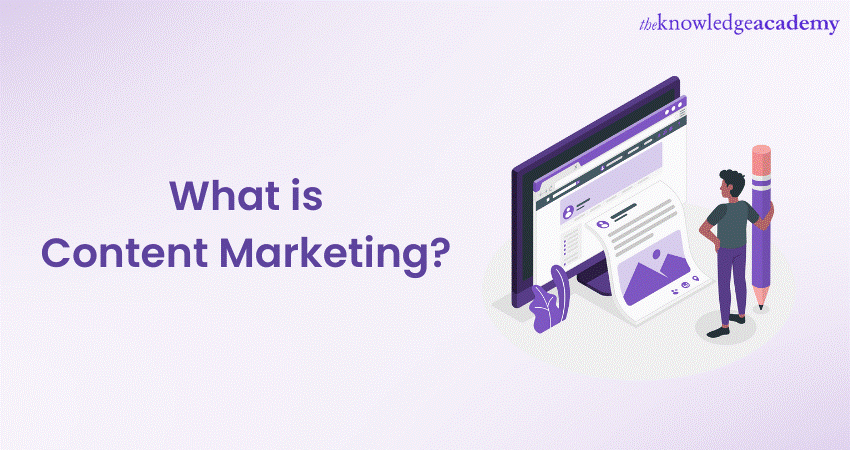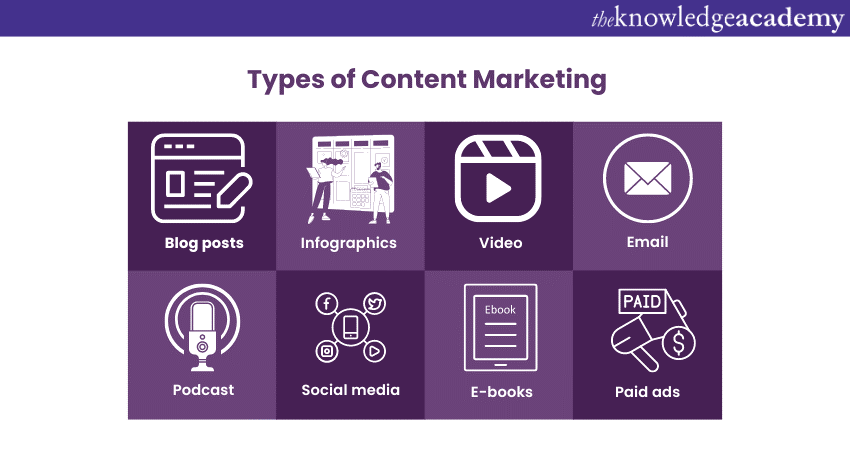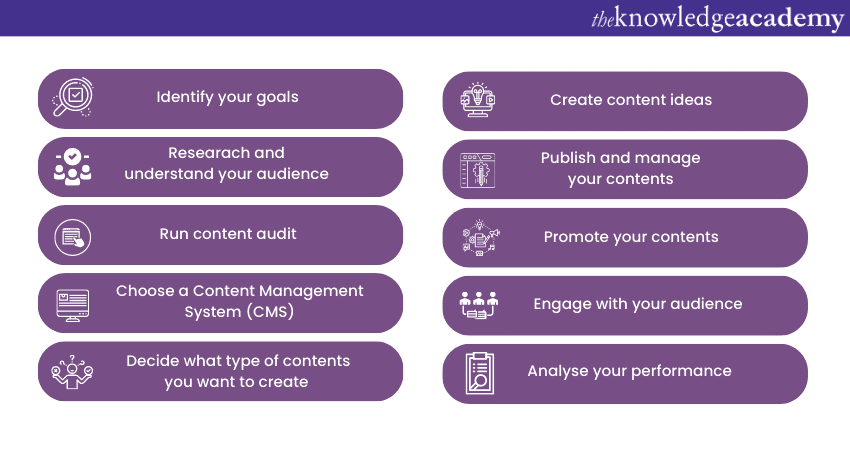We may not have the course you’re looking for. If you enquire or give us a call on + 1-866 272 8822 and speak to our training experts, we may still be able to help with your training requirements.
Training Outcomes Within Your Budget!
We ensure quality, budget-alignment, and timely delivery by our expert instructors.

Have you ever wondered how businesses grab your attention online? Or how do they find potential leads? It's all about Content Marketing! But do you know What is Content Marketing and why it has become a significant part of every enterprise?
Be it a small business or any B2B company, it has gained popularity among businesses. Basically, Content Marketing is a Digital Marketing strategy that is used to engage and attract an audience by sharing relevant and high-quality blogs, videos, infographics, and other types of media.
So, if you want to mark your presence online, this approach can help you generate millions of potential leads. Want to know how it works and why is it important? This blog will discuss what is Content Marketing, its benefits and types, and how it works to attract and retain customers.
Table of Content
1) Understanding What is Content Marketing
2) Benefits of Content Marketing
3) Types of Content Marketing
4) How to create Content Marketing strategy?
5) Conclusion
Understanding What is Content Marketing
Content Marketing meaning, the ability to communicate with customers, prospects, and target audiences without directly selling to them. It is a strategic method focused on making and sharing valuable, high-quality, and relevant content to attract and retain a specific audience.
Unlike regular ads pushing products or services, Content Marketing aims to give the audience valuable insights, helpful solutions, and experiences. The main purpose is to attract top-of-the-funnel customers and build a strong bond with the audience. Thus, it helps lead to higher brand awareness, loyalty, and, ultimately, more sales.

Benefits of Content Marketing
The following are some of the benefits of Content Marketing. Let's explore each of them in detail:
Increase online visibility
Content Marketing connects your business with more customers and website visitors, particularly when people are looking for something specific. Search engines reward websites that develop high-quality, relevant content with better search rankings.
Through effective content optimisation and the use of relevant keywords, businesses can attract organic traffic to their websites. This results in increased visibility and potential leads.
Lead generation
Content Marketing is also used to create leads and prospects. How? By driving traffic. This strategy helps in driving organic traffic to the website. When customers build their trust through your informative content and start feeling comfortable buying from your business. Thus, you can generate more leads and strengthen your relationship with potential customers.
Increased brand awareness
Brand awareness is another key reason why Content Marketing is important. It’s all about bringing your audience to get involved in what you do. When a person comes across your Content on Search Engine Result Pages (SERPs) or a post on social media platforms, they are exposed to your brand. As a result, they develop a connection with your products and services.
Enhanced customer engagement
Content Marketing can greatly support your business as it brings your brand name closer to the target market. It encourages meaningful interactions with the audience through likes, shares, comments, and discussions. This engagement not only strengthens the brand-consumer relationship but also widens the Content's reach through social sharing.
Increased ROI
The main aim of Content Marketing is to get more out of what you put in. When done properly, it can generate a high Return on Investment (ROI). After all, it's every company’s objective; to generate greater profits by increasing customer engagement.
Build authority
Creating informative content allows them to showcase their expertise and knowledge. This positioning as a knowledgeable resource not only builds credibility but also develops a sense of trust among customers. When customers see a brand as credible, they're more likely to buy things from them.
Nurturing customer relationships
Content Marketing offers businesses to connect with their audience on a personal level. By addressing the problems, needs, and desires of their customers, brands can establish an emotional connection that is not just about buying and selling. This connection makes customers want to stick around, buy again, and tell others about it.
Types of Content Marketing
Content Marketing can be performed in various forms, which makes it a powerful marketing strategy. Here are popular types of Content Marketing:

Blogs post
Blog posts and articles are the go-to content formats for many because they're easier and less risky. Writing high-quality blog posts not only improves your authority through SEO but also builds a strong connection with readers.
When your audience sees your blog as a trusted source, they're more likely to believe in your recommendations. This ultimately helps them trust your brand and products.
Infographics
Infographics are the second most powerful type to boost your Content Marketing game. Infographics help deliver information using eye-catching graphics, like graphs or flow charts.
When you present your data in the form of infographics, it looks more readable to your audience. Infographics Content Marketing is mostly ideal for small businesses as it is a low-cost marketing technique yet visually appealing. This provides a higher engagement rate.
Videos
Video marketing is also regarded as one of the best investments in Content Marketing strategy as it results in higher traffic, engagement, and sales. Creating engaging video content, such as tutorials and webinars, can attract and inform a wider audience. Video marketing includes a wide range of formats like the following:
a) Tutorials
b) Product demonstrations
c) Interviews
d) Webinars
e) Vlogs
f) Short-form content for platforms like TikTok or Instagram Reels
Email marketing has become widespread as it drives a huge ROI. Nowadays, almost three in four businesses utilise email newsletters to promote their Content. Email Marketing has diverse applications. They can use emails to reveal product launches and use them for newsletters that include subscriptions, discounts and promo codes, and informational Content.
Podcast
According to Nuvoodoo, more than 50% of people listen to podcasts while driving. That means people are increasingly moving towards listening to podcasts. So, with Podcast marketing, you can push Content Marketing to the next level.
Many businesses underestimate the power of podcasting because they have no idea how to use audio-only Content. But little do they know that podcasts are a growing platform for businesses to reach their target audience.
Social media
Social media platforms, including Instagram, Facebook, and Twitter, have emerged as the strongest Content Marketing platform. It’s effortless to use and can generate leads without much investment. By adding your product or website link on social media platforms, you can create leads and direct sales.
Today, every small to big business is building a social presence as a form of marketing. You can use videos, carousels, short content, and stories to educate your audience about your products or services. Apart from this, you can also run social media campaigns using paid promotions or ads since it has a higher audience.
E-books
E-books are effective B2B Content Marketing types that help in building credibility. It works differently compared to blog posts. They are usually long-form and provide in-depth knowledge about a particular topic. The e-book helps generate leads, although you must ensure that these digital publications deliver high-quality and genuine value.
Paid advertisements
Today, most Content Marketing strategies are organic (Free), businesses can also promote themselves using Paid Advertisements. However, Google Ads, paid promotions, and influencer marketing are some of the popular examples of paid advertisements that are emerging today.
Paid marketing content promotes your business to users on social media, search engines, and websites in the form of photos, texts, and videos. Although paid advertising seems expensive for many businesses, it can show quicker results compared to organic marketing strategies.
Unlock your career potential with our Introduction to Marketing Training to gain a competitive edge. Join now!
How to create Content Marketing strategy?
After understanding What is Content Marketing and its types, it's time to learn about how to make effective strategies. Today, writing a blog/article or uploading a video has become easier, but to achieve marketing goals, you need a proper strategy. How does it work? Let’s explore how to implement an effective Content Marketing Strategy:

1. Identify your goal
Setting a clear goal is the core step of an effective Content Marketing Strategy. Research the business and domain market and look at high-level business goals.
Moreover, figure out what you want to achieve – whether it's increasing website traffic, growing your email list, boosting sales, or enhancing brand awareness. Defining your goals guides your Content strategy and ensures that every piece of Content aligns with your overall business goals.
2. Research and understand your audience
It's time to research your target audience. This is the most crucial part of the content strategy. By knowing your audience, you can develop relevant Content that the audience finds interesting and informative.
So, do audience research to know their demographics, preferences, pain points, and online behaviour. This information helps you develop content that resonates with them, solves their problems, and builds a stronger connection. This ultimately leads to higher engagement and conversions.
3. Run content audit
Initially, most Content Marketers usually start with social media or blog posts. If you want to do it in different formats, run a content audit to analyse your lowest-performing and top-performing Content.
Also, conduct a comprehensive review of your existing content. Analyse its performance, including views, shares, comments, and conversions. This content audit highlights your strengths, identifies gaps, and provides insights into topics and formats that resonate most with your audience.
How to choose the right type of Cryptocurrency and where to buy them?
4. Choose a Content Management System (CMS)
Content creation, content publications, and content analytics are the crucial components of the Content Management System (CMS). A good CMS streamlines Content creation, editing, and distribution while enhancing your overall Content Marketing process. Choose a reliable Content Management System to organise, publish, and manage your Content effectively.
Today, WordPress has become one of the most widely used Content Management Systems. Its unique features of easy-to-use and user interface allow marketers to manage and track their Content. Another popular CMS is HubSpot, through which you can plan, produce, publish, and measure your results all on one platform.
5. Decide what type of content you want to create
Identify content formats that best suit your goals and resonate well with your target audience. Your content should provide genuine value to them. So, consider options such as blog posts, videos, podcasts, infographics, books, webinars, and social posts. Make sure the chosen formats align with your audience's preferences and your available resources.
6. Create content ideas
Brainstorm a list of content ideas based on your audience's needs and interests. Start by exploring industry trends, Frequently Asked Questions (FAQs), and problems that your products or services can address.
Moreover, add your ideas to the Content calendar. These ideas are the foundation for your Content creation strategy. So, make sure to jot down creative and relevant Content ideas.
7. Publish and manage your content
Once you have created a list of ideas, it's time to produce and share content according to your content calendar. Come up with captivating headlines and make sure your content delivers value, educates, entertains, and informs your target audience. Also, utilise SEO best practices to optimise your content for search engines while improving its accountability.
8. Promote your content
Share your content across multiple platforms like Facebook, Instagram, and YouTube to maximise its reach. Leverage social media platforms, email newsletters, influencer collaborations, and online communities to amplify your Content's visibility. Also, try to personalise your promotional efforts to each platform's unique audience and features, as it will help with higher engagement and reach.
9. Engage with your audience
Your effort doesn’t stop here. Once your content is published, you should actively engage with the audience to build your relationships. Encourage interactions and discussions around your Content. Further, respond to their comments, messages, and inquiries instantly. This helps cultivate loyalty and encourages them to become brand advocates.
10. Analyse your performance
Make use of tools like Google Analytics, social media insights, and email marketing analytics to track the performance of your content. Monitor metrics, including website traffic, engagement rates, social media shares, and conversion rates. This information will help you understand what is working and what needs improvement.
You can also make adjustments to your strategy based on your performance data. Do a regular analysis of your strategy and make enhancements to achieve better results over time. Lastly, maintain consistency. Create a regular posting schedule to engage your audience and come back for more. Moreover, regular updates also signal to search engines that your website is active and relevant.
Leve-up your marketing game with our Email Marketing Course, Join today!
Conclusion
We hope that after reading this blog you got the answer to What is Content Marketing. It is a foundational strategy for businesses wanting to connect with their audience in meaningful ways. By delivering valuable and relevant content, brands can establish themselves as trusted resources and build lasting relationships with their customers.
Learn the art of marketing with our rigorous Content Marketing Masterclass and become an expert Content Marketer. Join today!
Frequently Asked Questions
Upcoming Digital Marketing Resources Batches & Dates
Date
 Content Marketing Course
Content Marketing Course
Fri 17th Jan 2025
Fri 7th Mar 2025
Fri 23rd May 2025
Fri 18th Jul 2025
Fri 12th Sep 2025
Fri 12th Dec 2025







 Top Rated Course
Top Rated Course


 If you wish to make any changes to your course, please
If you wish to make any changes to your course, please


